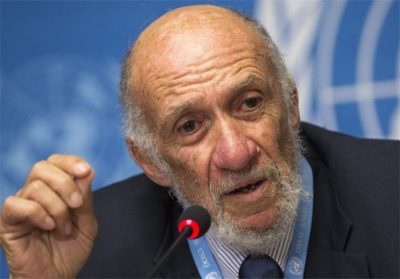US Support for Saudi Aggression on Yemen Reinforced under Trump

Professor Richard Falk highlights the US role in Saudi Arabia’s war on Yemen while suggesting that Washington’s support for Riyadh’s illegal aggression has increased under the presidency of Donald Trump.
“Since the presidency of Donald Trump, the US has reinforced its support for Saudi Arabia’s aggression against Yemen,” Richard A. Falk said in an interview with Tasnim News Agency.
“The nature of this aggression is a flagrant violation of the UN Charter and of international law,” said Falk, who has served as the UN special rapporteur on the situation of human rights in the Palestinian territories.
The following is the full text of Interview:
Tasnim: For two years, the Yemeni civilians have been targets of cruel attacks and airstrikes by the Saudi-led coalition. Yemen’s Legal Center for Rights and Development, an independent monitoring group, has recently put the civilian death toll at 12,041, including 2,568 children and 1,870 women. According to the United Nations, nearly 3.3 million people in Yemen, including 2.1 million children, are acutely malnourished because of the war and total siege imposed on them. They include 460,000 children under age of five with the worst form of malnutrition, who risk dying of pneumonia or diarrhea. Why is the international community so indifferent to the heinous crimes committed by the Al Saud regime in the Arabian Peninsula country?
Falk: It is a sad and tragic situation, and reflects the inability of the international community to respond effectively and consistently to even the most severe humanitarian crises when, as here, major geopolitical obstacles exist. The role of Saudi Arabia in creating and aggravating this crisis in Yemen is central, and given Saudi leverage within the UN as reinforced by the backing of the United States, paralyzes all UN efforts to respond on behalf of the victimized Yemeni population. All in all, what the Yemen situation underscores is the primacy of geopolitics in the Middle East, which is mainly responsible for this terrible ordeal of human suffering being experienced by the civilian populations of several societies in the Arab world.
Tasnim: Certain Western countries are continuously claiming that they are champions of human rights. However, it seems that they are pursuing double standard policies on Saudi Arabia’s atrocities. On March 10, 2017, the administration of US President Donald Trump approved the resumption of weapons sales to Saudi Arabia which critics have linked to Riyadh’s killing of civilians in Yemen. The $1.15 billion deal was previously blocked by former President Barack Obama after Saudi warplanes targeted a funeral hall in Yemen killing scores of civilians, provoking an international outcry. How do you see the role of the US in the regime’s aggression against the impoverished Arab country?
Falk: Since the presidency of Donald Trump, the US has reinforced its support for Saudi Arabia’s aggression against Yemen. The nature of this aggression is a flagrant violation of the UN Charter and of international law.
The failure to condemn this operation, and the scandal of extending diplomatic support and engaging in military sales to the Saudi government, underlines my prior mention of the primacy of geopolitics.
Tasnim: Since the start of its war on Yemen, the Saudi regime has failed to reach its objectives. In 2015, the kingdom had a record budget deficit of almost $100 billion, prompting it to rein in public spending in a bid to save money. Why is the regime continuing its heinous attacks on the Arab country despite its failures and cash-strapped economy?
Falk: Of course, I am not in a position to know what motivates such self-defeating behavior on the part of the Saudi government. I can only guess that their paranoid concerns about the stability of their own governing structure seems threatened by the emergence of a government in Yemen that is perceived as hostile. As their intervention in Bahrain back in 2011 illustrated, the leadership in Riyadh is extremely threatened by what is perceived to be an adverse political development in a neighboring country. And then, of course, Saudi regional policies, as particularly evident in Syria, emphasize sectarian preoccupations with the containment of Shiite influence. It is not uncommon for authoritarian governments to be so obsessed with their own security—not national security, but regime security—that all other concerns are subordinated.
Tasnim: The situation across the world, the Middle East in particular, is very confusing. What are your predictions regarding the future of the Middle East and the world?
Falk: With so many contradictory forces, a variety of regional and global intervening actors, and a variety of extremist movements, it is impossible to predict the future of the region. It is to be hoped that the carnage and suffering will finally encourage countries such as the United States and Russia to use their leverage to produce ceasefires and political compromises, although such efforts will themselves be fragile. Underlying all the turmoil are three adverse factors: the colonial legacy of 100 years ago that carved up the region into artificial political communities, reflecting the colonial ambitions of Britain and France; Western geopolitical intervention, focusing on oil, Israeli and Saudi support, containment of Iranian influence; the unresolved Israel/Palestine conflict, and the imposition of an apartheid structure of domination and abuse on the Palestinian people.
Richard A. Falk is the author or co-author of 20 books and the editor or co-editor of another 20 volumes. In 2008, the United Nations Human Rights Council (UNHRC) appointed Falk to a six-year term as a United Nations Special Rapporteur on “the situation of human rights in the Palestinian territories occupied since 1967”.

